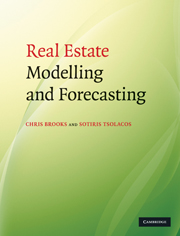Book contents
- Frontmatter
- Contents
- List of figures
- List of tables
- List of boxes
- Preface
- Acknowledgements
- 1 Introduction
- 2 Mathematical building blocks for real estate analysis
- 3 Statistical tools for real estate analysis
- 4 An overview of regression analysis
- 5 Further issues in regression analysis
- 6 Diagnostic testing
- 7 Applications of regression analysis
- 8 Time series models
- 9 Forecast evaluation
- 10 Multi-equation structural models
- 11 Vector autoregressive models
- 12 Cointegration in real estate markets
- 13 Real estate forecasting in practice
- 14 The way forward for real estate modelling and forecasting
- References
- Index
14 - The way forward for real estate modelling and forecasting
Published online by Cambridge University Press: 05 June 2012
- Frontmatter
- Contents
- List of figures
- List of tables
- List of boxes
- Preface
- Acknowledgements
- 1 Introduction
- 2 Mathematical building blocks for real estate analysis
- 3 Statistical tools for real estate analysis
- 4 An overview of regression analysis
- 5 Further issues in regression analysis
- 6 Diagnostic testing
- 7 Applications of regression analysis
- 8 Time series models
- 9 Forecast evaluation
- 10 Multi-equation structural models
- 11 Vector autoregressive models
- 12 Cointegration in real estate markets
- 13 Real estate forecasting in practice
- 14 The way forward for real estate modelling and forecasting
- References
- Index
Summary
Learning outcomes
In this chapter, you will find a discussion of
the reasons for the increasing importance of forecasting in real estate markets;
techniques that are expected to apply increasingly in real estate modelling;
formats that forecasting can take for broader purposes; and
the need to combine top-down with bottom-up forecasting.
Real estate modelling and forecasting constitute an area that will see notable advancements in the future, and progress is likely to be achieved in several ways. The methodologies and techniques we have presented in this book will be more widely applied in real estate analysis. We also expect to see the employment of more sophisticated approaches in real estate. Such techniques are already applied in academic work on the real estate market and could be adopted in practice.
There are several reasons why modelling and forecasting work in the real estate field will grow and become a more established practice.
The globalisation of real estate capital and the discovery of new markets will prompt a closer examination of the data properties and relationships in these markets. Comparisons will be required with more core markets. Investors are interested in establishing possible systematic relationships and studying the sensitivities of real estate variables in these markets to their drivers. Investors would also like to know whether these markets are forecastable.
[…]
- Type
- Chapter
- Information
- Real Estate Modelling and Forecasting , pp. 434 - 440Publisher: Cambridge University PressPrint publication year: 2010



